For the third year in a row, citizens in most of the world see business as the most-trusted institution, above government, media, and NGOs, found in the 2023 Edelman Trust Barometer, unveiled this week at the annual World Economic Forum in Davos, Switzerland.
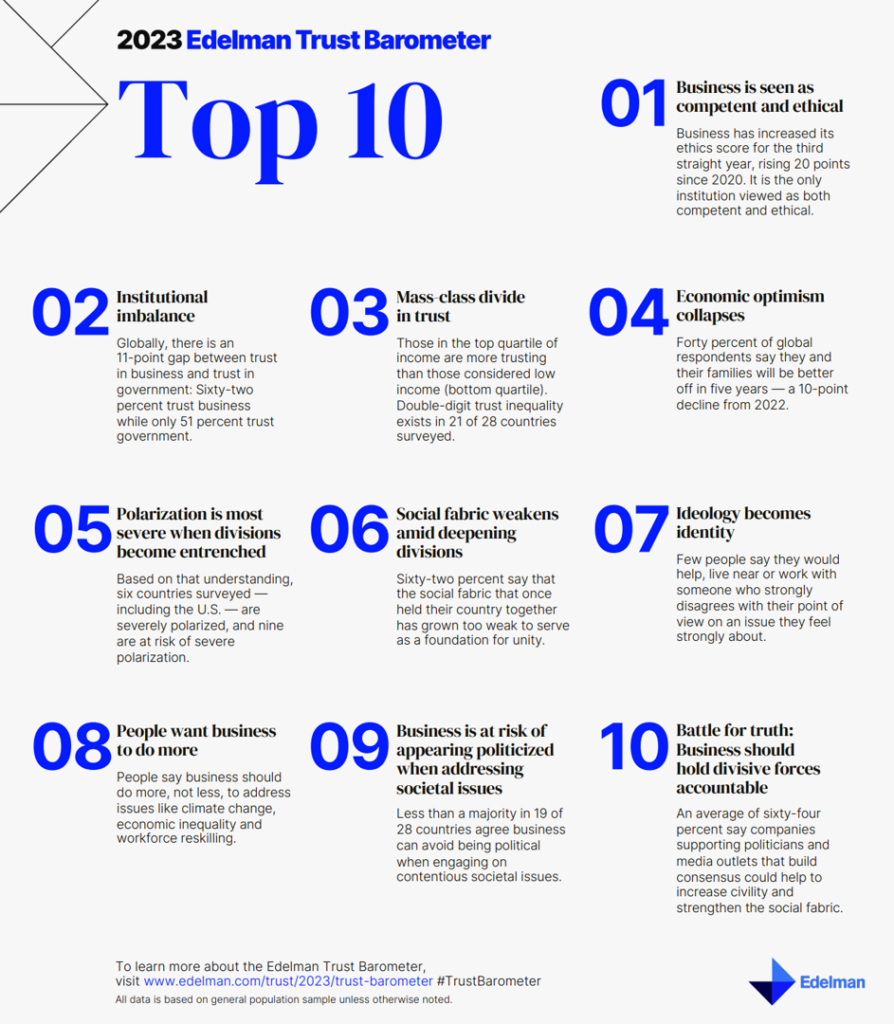
The Edelman team conducted this 23rd annual study in November 2022 in 28 countries, among over 32,000 people — some 1,150 residents per country polled. (Note that Russia, studied in the surveys between 2007 and 2022, was not included in the 2023 research).
The first chart arrays the Top 10 findings of the 2023 Edelman Trust Barometer, with the over-arching theme of Navigating a Polarized World.
In 2022, Edelman coined the findings as “The Cycle of Distrust,” in 2021 “Business Most Trusted,” and in 2020, “Trust: Competence and Ethics.”
This survey report is the first of several that Edelman will produce in the coming months: it’s a global look at the top-line findings, so I will distill what I can regarding the U.S. insights along with those touching on health. But stay tuned for more granular health insights here in Health Populi. For the 2022 health/care specifics on Trust, I wrote an essay for Edelman on “Trust as a Determinant of the Health Economy” published on Edelman’s site last spring.
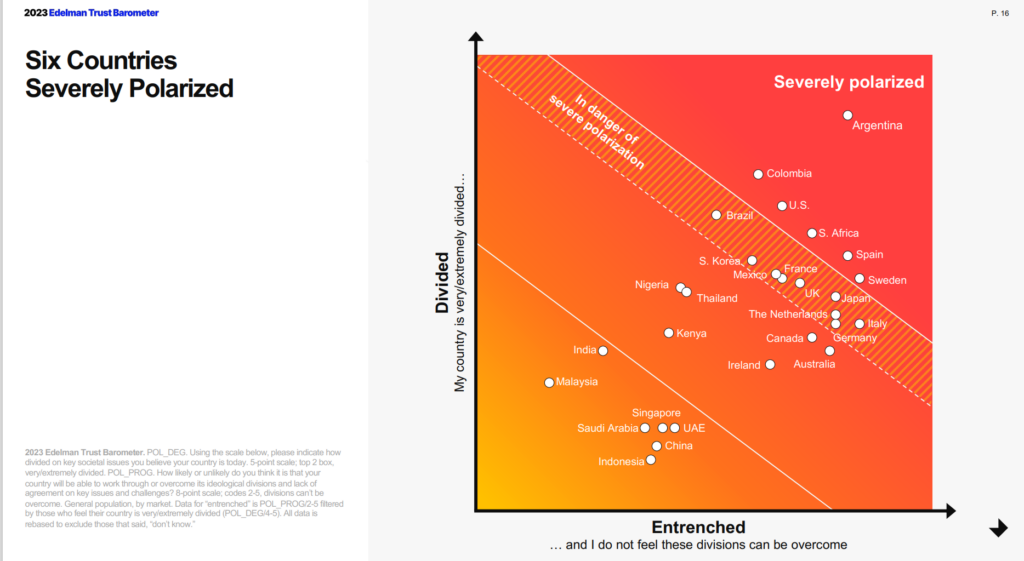
With polarization the central theme of this year’s findings, Edelman identified the six nations with most severe polarization felt by people living in each country; these include Argentina, maximally challenged by polarization, and then Colombia, the U.S., South Africa, Spain, and Sweden the five additional “severely polarized” lands.
Lease polarized, you might want to know, were India, Malaysia, Singapore, Saudi Arabia, the UAE, China, and Indonesia.
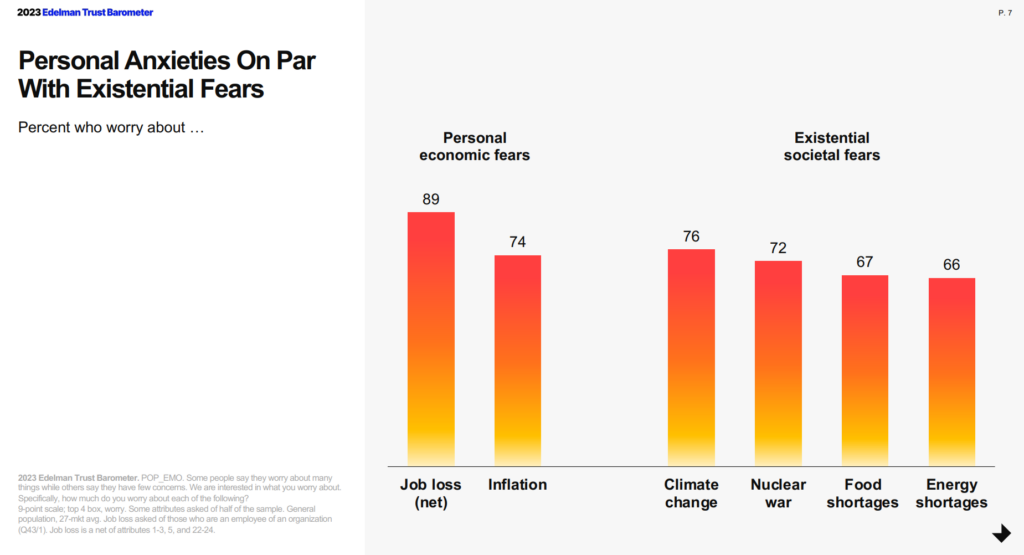
Underpinning our polarization and anxieties are personal and existential fears: on a global level, namely, job loss and inflation on the personal front, and on the societal/existential ledger climate change, nuclear war, food shortages, and energy supplies.
Economic optimism is “collapsing” in Edelman’s word, based on responses to the question: :How do you think you and your family will be doing in five years’ time?
24 of the 28 countries’ polled are at an all-time low for this question on being better-off in 5 years. In the U.S. that’s 36% of people who feel optimistic for the 5-year timeframe. Lest you Americans feel totally awful about that finding, note that only 9% of people in Japan, 12% of the French, 15% of Germans, 18% of Italians, 19% of the Dutch, and 23% of Britons feel they will be better off in 5 years.
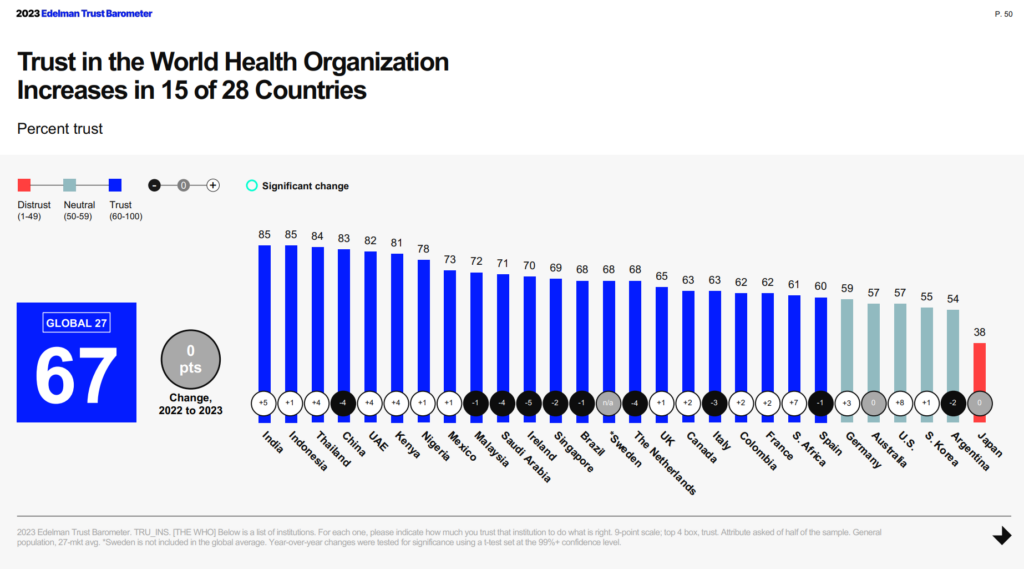
On the upside for health and trust, the most-trusted institutional leader in this year’s study is scientists, with 76% of global citizens trusting scientists (fairly even with last year with a 1 point uptick in trust).
To that point, some good news on the health front, too, when it comes to trust in the World Health Organization, a good proxy for trust in public health and perhaps science-fact. WHO is the most-trusted multinational organization in the world (above the UN and the EU). In the U.S., peoples’ trust in the WHO grew by 8 percentage points for this year’s gauge, the largest percent point increase across the 28 countries studied.
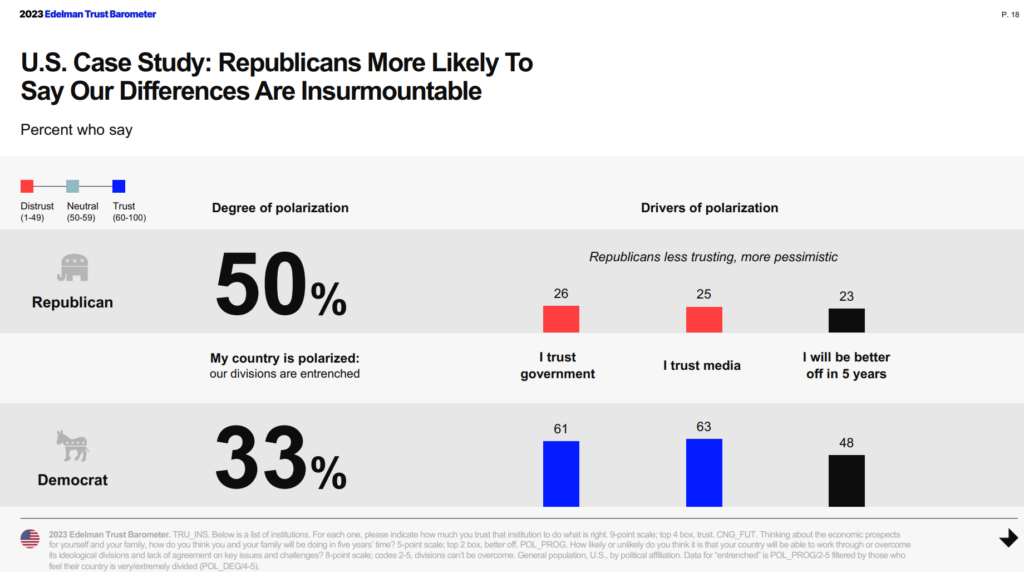
Health Populi’s Hot Points: Trust, or lack thereof, is a toxic pre-existing condition when it comes to public health.
Our positive health behaviors beget a virtuous flywheel of well-being, research has shown. Check out Christakis and Fowler if you don’t believe me, among others who have quantified the statistical viral power of healthy behaviors on our immediate and further-out social networks.
Trust is also the precursor for health engagement, Edelman learned back in 2008 when it launched a survey called the Edelman Health Engagement Barometer. I had the great good fortune to work with the team on the study launch and follow-up surveys for several years. We found in the first year of the consumer survey that 3 factors attracted health consumers to engage with organizations for personal health: those factors are,
- Trust
- Authenticity, and
- Satisfaction.
Trust in the U.S. among many health citizens is low, and gets in the way of our supporting our own flourishing and that of our fellow Americans.
Check out the last chart here, the U.S. Case Study from the 2023 Edelman Trust Barometer which explored partisan differences in America. One in two Republicans said that our differences are “insurmountable.” One in three Democrats said the same. Now, look at the drivers of polarization graphed on the right: over twice as many Democrats trust government, trust media. and believe they will be better off in five years.
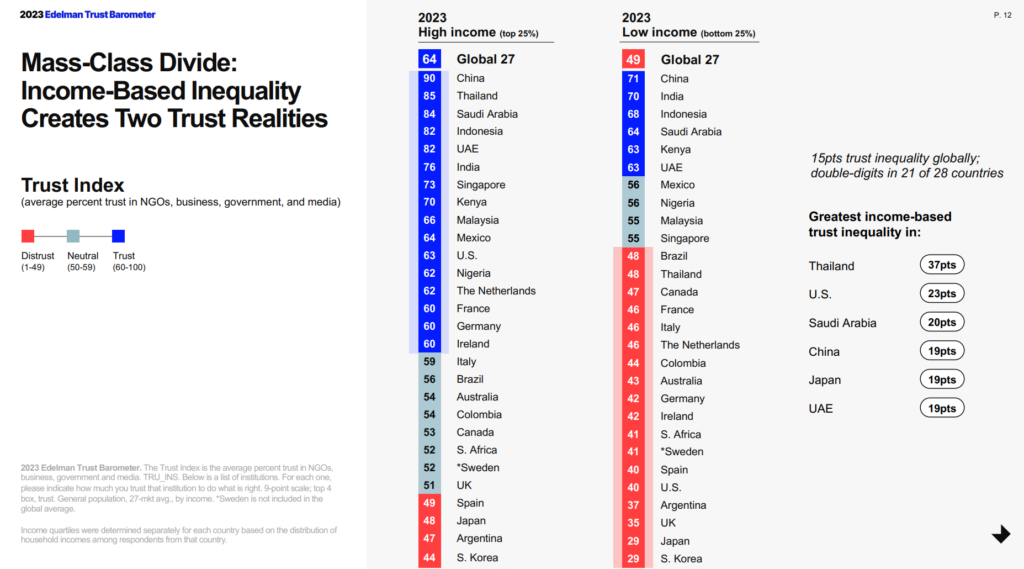
A further dive into polarization in the U.S, is illustrated in this last chart from Edelman’s 2023 report, segmenting respondents between higher and lower income strata.
You can see on the high income side, 63% of U.S. residents are trusting on the Edelman index; on the lower-income side, see that only 40% of U.S. folks rank low on trust (or higher on distrust in this methodology).
Edelman notes that the U.S. is second-highest among six nations with the greatest income-based trust inequality.
This trust polarity bodes ill for public health and trust in re-building the drivers of health for a flourishing society. I look forward to seeing future data releases from Edelman this year that focus on health and health care stakeholders and segments of the industry — hospitals, pharma, consumer health, and clinicians. The more we can learn about trust and health, the more we can inform our plans and strategies to help build a more resilient, person-centered, equitable health system for all.
As always, thanks to Edelman for mounting this important research every year at this time. While the past few years’ releases have been very sobering, we can’t look away from the reality that people are in pain, polarized, and primed for another year of anxiety and stress.


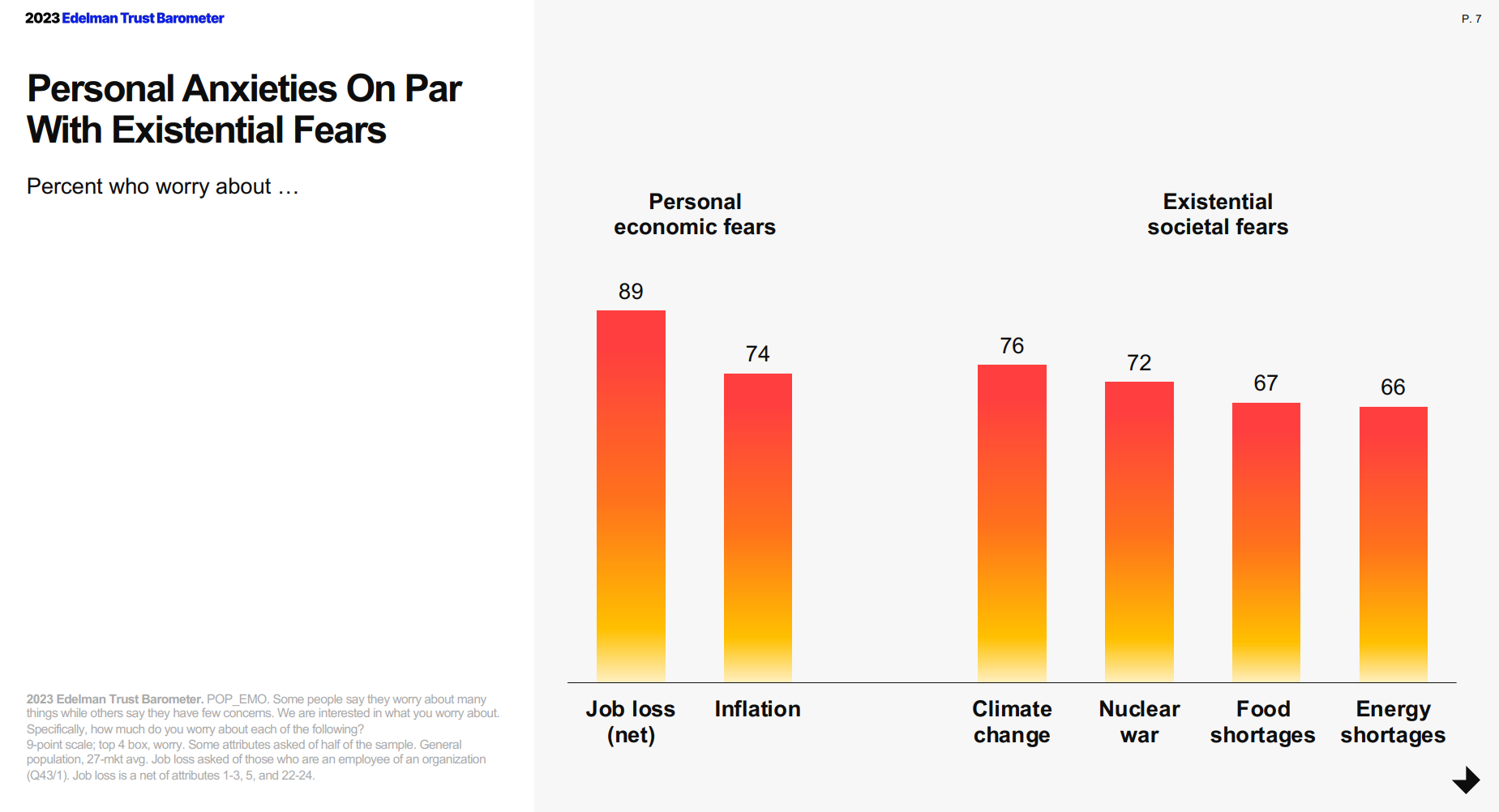


 I am so grateful to Tom Lawry for asking me to pen the foreword for his book, Health Care Nation,
I am so grateful to Tom Lawry for asking me to pen the foreword for his book, Health Care Nation,  I love sharing perspectives on what's shaping the future of health care, and appreciate the opportunity to be collaborating once again with Duke Corporate Education and a global client on 6th May. We'll be addressing some key pillars to consider in scenario planning such as growing consumerism in health care, technology (from AI to telehealth), climate change, and trust -- the key enabler for health engagement or dis-engagement and mis-information. I'm grateful to be affiliated with the corporate education provider
I love sharing perspectives on what's shaping the future of health care, and appreciate the opportunity to be collaborating once again with Duke Corporate Education and a global client on 6th May. We'll be addressing some key pillars to consider in scenario planning such as growing consumerism in health care, technology (from AI to telehealth), climate change, and trust -- the key enabler for health engagement or dis-engagement and mis-information. I'm grateful to be affiliated with the corporate education provider  Thank you FeedSpot for
Thank you FeedSpot for